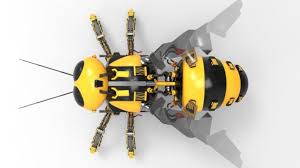
Breaking News
 2 Hours of Retro Sci-Fi Christmas Songs | Atomic-Age Christmas at a Snowy Ski Resort
2 Hours of Retro Sci-Fi Christmas Songs | Atomic-Age Christmas at a Snowy Ski Resort
 Alternative Ways to Buy Farmland
Alternative Ways to Buy Farmland
 LED lights are DEVASTATING our bodies, here's why | Redacted w Clayton Morris
LED lights are DEVASTATING our bodies, here's why | Redacted w Clayton Morris
Top Tech News
 Travel gadget promises to dry and iron your clothes – totally hands-free
Travel gadget promises to dry and iron your clothes – totally hands-free
 Perfect Aircrete, Kitchen Ingredients.
Perfect Aircrete, Kitchen Ingredients.
 Futuristic pixel-raising display lets you feel what's onscreen
Futuristic pixel-raising display lets you feel what's onscreen
 Cutting-Edge Facility Generates Pure Water and Hydrogen Fuel from Seawater for Mere Pennies
Cutting-Edge Facility Generates Pure Water and Hydrogen Fuel from Seawater for Mere Pennies
 This tiny dev board is packed with features for ambitious makers
This tiny dev board is packed with features for ambitious makers
 Scientists Discover Gel to Regrow Tooth Enamel
Scientists Discover Gel to Regrow Tooth Enamel
 Vitamin C and Dandelion Root Killing Cancer Cells -- as Former CDC Director Calls for COVID-19...
Vitamin C and Dandelion Root Killing Cancer Cells -- as Former CDC Director Calls for COVID-19...
 Galactic Brain: US firm plans space-based data centers, power grid to challenge China
Galactic Brain: US firm plans space-based data centers, power grid to challenge China
 A microbial cleanup for glyphosate just earned a patent. Here's why that matters
A microbial cleanup for glyphosate just earned a patent. Here's why that matters
 Japan Breaks Internet Speed Record with 5 Million Times Faster Data Transfer
Japan Breaks Internet Speed Record with 5 Million Times Faster Data Transfer
Walmart just filed six patents for robot bees - and it sounds like an episode straight out of ...

(Natural News) As honeybees and other vital pollinators continue their decline into what looks like total extinction, the Walmart corporation appears to be in the process of developing artificial bee "robots" that will presumably one day be used to pollinate plants in the absence of real bees, as well as identify crop damage and even spray pesticides.
A total of six different patents have reportedly been filed by Walmart at the United States Patent Office (USPO) in recent weeks for tiny "unmanned vehicles" that, based on their respective descriptions, are gearing up to be used in commercial food production once bees are no longer in existence.
One of the primary purposes for these robot bees will be to utilize "machine vision" in monitoring crop damage throughout large growing fields, as they'll apparently be equipped to "visualize" these abnormalities on plants in order to identify their pest culprits. After being sent to the "scene of the crime," these robot bees will be programmed to address whatever problem is present, whether it be something as simple as shooing away pesky birds, or blasting a stream of pesticides in a particular area –kind of like an army of next-generation, "Terminator" destroyers.
The technology may also be used to replace mass chemical sprayings in general, as killer robots bees could be programmed to spray chemicals on an as-needed basis. Rather than having to blanket an entire crop in pesticides, robot bees could theoretically be programmed to detect only the areas where pests or disease are present, and spray accordingly.
"We're always thinking about new concepts and ways that will help us further enhance how we serve customers, but we don't have any further details to share on these patents at this time," Walmart is quoted as saying in a statement.
GMOs, neonicotinoids driving pollinator losses that Walmart wants to replace with robot bees
The patents were filed not that long after Japanese researchers last year demonstrated similar technology. Reports indicate that tiny, remote-controlled drones were featured at an event there that focused on on next-generation pollination technologies – the implication again being that bees and other natural pollinators are on their way out.
Without bees, more than 1,000 plants grown for food, fiber, medicine and other purposes would cease to exist, according to the Pollinator Partnership. The prolific use of genetically-modified organisms (GMOs) and their corresponding crop chemicals is largely to blame, as is the use of so-called "neonicotinoid" pesticides that studies have shown are responsible for triggering "colony collapse disorder" (CCD), or the widespread annihilation of honeybees.
"In recent years, the amount of pollinators (e.g. ants, bees, beetles, butterflies wasps, etc.) has been in steady decline, which leads to reduced fertility and biodiversity of the crops and reduced crop production," one of the patents reads, according to Newsweek.

 $100 SILVER CONFIRMED?
$100 SILVER CONFIRMED?

